- Home
- Blake Pierce
Cause to Kill (An Avery Black Mystery—Book 1) Page 5
Cause to Kill (An Avery Black Mystery—Book 1) Read online
Page 5
Dylan stiffened and was about to speak, but said nothing.
“And Dylan? Meet Avery Black, former criminal defense attorney that screwed up and released one of the world’s worst serial killer onto the streets of Boston, a man that killed again and destroyed her life. She leaves behind a multimillion-dollar gig, an ex-husband, and a kid that barely talks to her. And, like you, she’s usually drowning her sorrows in work and alcohol. You see? You two have more in common than you think.”
He turned deadly serious.
“Don’t embarrass me again, or you’re both off the case.”
CHAPTER EIGHT
Left alone in the conference room together, Avery and Dylan sat across from each other for a few moments in absolute silence. Neither one of them moved. His head was low. A grimace lined his face and he seemed to be mulling something over. For the first time, Avery felt some sympathy for him.
“I know what it’s like—” she began.
Dylan stood up so fast and stiffly that his chair slid back and hit the wall.
“Don’t think this changes anything,” he said. “You and I are nothing alike.”
Although his menacing body language emanated anger and distance, his eyes said something different. Avery was sure he was on the verge of a breakdown. Something the captain had said affected him, just like it had affected her. They were both damaged, lonely. Alone.
“Look,” she offered, “I just thought.”
Dylan turned away and opened the door. His profile on the way out confirmed her fears: there were tears in his bloodshot eyes.
“Dammit,” she whispered.
Nights were the worst for Avery. She had no steady group of friends anymore, no real hobbies other than the job, and she was so tired that she couldn’t imagine doing more legwork. By herself at the large, blond table, she hung her head low and dreaded what came next.
The way out of the office was like every other day, only there was a charged feeling in the air, and many on the force were even more emboldened by her front page story.
“Hey, Black,” someone called and pointed to her cover photo. “Nice face.”
Another officer tapped on the image of Howard Randall.
“This story says you two were very close, Black. You into gerontophilia? You know what that means? It means you like to fuck old people.”
“You guys are hilarious.” She smiled and shot her fingers out like guns.
“Fuck you, Black.”
* * *
A white BMW was parked in the garage; five years old, dirty and worn. Avery had bought it at the height of her success as a defense attorney.
What were you thinking? she mused. Why would anyone buy a white car?
Success, she remembered. The white BMW had been bright and flashy, and she wanted everyone to know she was a boss. Now, it was a reminder of her failed life.
Avery’s apartment was on Bolton Street in South Boston. She owned a small two-bedroom on the second floor of a two-story building. The place was a downgrade from her former penthouse high-rise, but it was spacious and neat, with a nice terrace where she could sit and relax after a hard day’s work.
The living room was an open space with shaggy brown carpeting. The kitchen was to the right of the front door, and separated from the rest of the room by two large islands. There were no plants or animals. A northern exposure ensured the apartment was usually dark. Avery threw her keys on the table and shed the rest of her belongings: gun, shoulder harness, walkie-talkie, badge, belt, phone, and wallet. She undressed on the way to the shower.
After a long soak to process the events of the day, she put on a robe, grabbed a beer from the fridge, then her phone, and headed out to the terrace.
Nearly twenty missed calls flashed on her cell, along with ten new messages. Most of them were from Connelly and O’Malley. There was a lot of screaming.
Sometimes Avery was so single-minded and driven she refused to pick up for anyone that wasn’t essential to her task, especially when all of the pieces hadn’t been put together; today was one of those days.
She scrolled down through last numbers dialed—and all the people that had called her in the past month. Not a single one was her daughter, or her ex-husband.
Suddenly, she missed them both.
Numbers were dialed.
The phone rang.
A message answered: “Hi, this is Rose. I’m not here right now to take your call, but if you leave a brief message, and your name and number, I’ll get back to you as soon as I can. Thanks so much.” Beep.
Avery hung up.
She toyed with the idea of calling Jack, her ex. He was a good man, her college sweetheart with a heart of gold: a truly decent person. They’d had a torrid affair when she was eighteen, and she, with a sickening ego after her dream job, had ruined everything.
For years, she blamed other people about the split, and for the rift with her daughter: Howard Randall for his lies, her old boss, the money, the power, and all those people she had to constantly entertain and beguile to stay one step ahead of the truth: Little by little, her clients had become less reliable, and still she wanted to keep going, to ignore the truth, to bend justice one way or the other—simply to win. Only one more case, she often told herself. Next time, I’ll defend someone truly innocent and set the record straight.
Howard Randall had been that case.
I’m innocent, he’d cried at their first meeting. These students are my life. Why would I hurt one of them?
Avery had believed him, and for the first time in a long time, she had begun to believe in herself. Randall was a world-renowned psychology professor at Harvard, in his sixties, with no motive and no known history of his unhinged personal beliefs. More than that, he appeared weak and broken, and Avery had always wanted to defend the weak.
When she got him off, it was the highlight of her career, the highest of heights—that is, until he purposely killed again to expose her as a fraud.
All Avery had wanted to know was: why?
Why would you it? she’d asked him once in his cell. Why would you lie and set me up, just to go to prison for the rest of your life?
Because I knew you could be saved, Howard had replied.
Saved, Avery thought.
Is this salvation? she wondered and viewed her surroundings. Here? Now? No friends? No family? A beer in hand and a new life hunting down killers to make amends for my past? She took a swig of her drink and shook her head. No, this isn’t salvation. At least not yet.
Her thoughts turned to the killer.
A picture of him had begun to form in her mind: quiet, lonely, desperate for attention, a specialist with herbs and corpses. She ruled out an alcoholic or drug addict. He was too careful. The minivan harked to a family, but his actions seemed to indicate a family was what he wanted, not what he had.
Her mind swirling with thoughts and images, Avery downed two more beers before she suddenly fell asleep in her cozy outdoor chair.
CHAPTER NINE
In her dreams, Avery was with her family again.
Her ex was an athletic man with cropped brown hair and dazzling green eyes. Avid climbers, they were on a hike together with their daughter, Rose; she was only sixteen and had already received an early admission to Brandeis College, even though she was only a junior in high school, but in the dream she was six. They were all singing and walking along a path surrounded by dense trees. Dark birds fluttered and cried out before the trees morphed into a shadowy monster and a knife-like hand stabbed Rose in the chest.
“No!” Avery screamed.
Another hand stabbed Jack and both he and her daughter were hoisted away.
“No! No! No!” Avery cried.
The monster lowered.
Dark lips whispered in her ear.
There is no justice.
Avery jolted awake to the sound of incessant ringing. She was still on the terrace in her robe. The sun had already come up. Her phone continued to blare.
She p
icked up.
“Black.”
“Yo Black!” Ramirez answered. “Don’t you ever pick up? I’m downstairs. Get your shit together and get out here. I’ve got coffee and sketch samples.”
“What time is it?”
“Eight-thirty.”
“Give me five minutes,” she said and hung up.
The dream continued to permeate her thoughts. Sluggishly, Avery rose and headed into the apartment. Her head pounded. Faded blue jeans were tugged on. A white T-shirt was made respectable by a black blazer. Three chugs of orange juice and a downed granola bar was breakfast. On the way out, Avery glanced at herself in the mirror. Her attire, and her morning meal, were a far cry from thousand-dollar suits and daily breakfast at the finest restaurants. Get over it, she thought. You’re not here to look pretty. You’re here to bring in the bad guys.
Ramirez handed her a cup of coffee in the car.
“Looking good, Black,” he joked.
As always, he appeared to be the model of perfection: dark blue jeans, a light-blue button-down shirt, and a dark-blue jacket with light-brown belt and shoes.
“You should be a model,” Avery grumbled, “not a cop.”
A smile displayed his perfect teeth.
“Actually, I did do a little modeling once.”
He pulled out of the breezeway and headed north.
“You get any sleep last night?” he asked.
“Not much. How about you?”
‘“I slept like a baby,” he said proudly. “I always sleep well. None of this gets to me, you know? I like to let it ride,” he said and waved his hand through the air.
“Any updates?”
“Both boys were home last night. Connelly put a watch on them just to make sure they didn’t bolt. He also talked to the dean to get some information and make sure no one freaks out about a bunch of plainclothes cops hanging around campus. Neither kid has a file. Dean said they’re both good boys from good families. We’ll see today. Nothing yet from Sarah on the facial recognition. We should hear something this afternoon. A few dealerships called me back with names and numbers. I’m just going to keep a list for a while and see what happens. You see the morning paper?”
“No.”
He pulled it out and threw it on her lap. In big, bold letters, the headline read “Murder at Harvard.” There was another picture from Lederman Park, along with a smaller photo of the Harvard campus. The article inside rehashed the editorial from the previous day and included a smaller picture of Avery and Howard Randall from their days in court together. Cindy Jenkins was mentioned by name but there was no photo given.
“Slow day in the news?” Avery said.
“She’s a white girl from Harvard,” Ramirez replied, “of course it’s big news. We gotta keep those white kids safe.”
Avery raised a brow.
“That sounds vaguely racist.”
Ramirez vigorously nodded.
“Yeah,” he agreed, “I’m probably a little racist.”
They wove through the streets of South Boston and headed over the Longfellow Bridge and into Cambridge.
“Why’d you become a cop?” she asked.
“I love being a cop,” he said. “Father was a cop, grandfather was a cop, and now I’m a cop. Went to college and got bumped up quick. What’s not to love? I get to carry a gun and wear a badge. I just bought myself a boat. I go out on the bay, chill out, catch some fish, and then catch some killers. Doing God’s work.”
“Are you religious?”
“Nah,” he said, “just superstitious. If there is a god, I want him to know I’m on his side, you know what I mean?”
No, Avery thought, I don’t.
Her father had been an abusive man, and while her mother faithfully went to church and prayed to God, she was more of a fanatic than anything else.
The voice from her dream returned.
There is no justice.
You’re wrong, Avery replied. And I’m going to prove it.
* * *
Most Harvard seniors lived off-campus in some of the residential housing units owned by the school. George Fine was no exception.
Peabody Terrace was a large high-rise set along the Charles River near Akron Street. The white, twenty-four-story building included an expansive outdoor patio, beautiful lawns, and a clear view across the river for those students lucky enough to be placed on the higher floors; George was one of them.
A number of buildings connected Peabody Terrace. George Fine lived in Building E on the tenth floor. Ramirez parked his car along Akron Street and they made their way inside.
“Here’s his picture,” Ramirez said. “He should be asleep right now. His first class isn’t until ten thirty.”
The image was a smaller crop of a larger picture pulled of the Internet. It showed a disgruntled, extremely cocky student with oily black hair and dark eyes. A slight grin was on his face; he seemed to be challenging the photographer to find a flaw with his perfection. A strong jaw and pleasant features made Avery wonder why he was called a weirdo. He looks confident, she thought. So why stalk a girl that obviously has no interest in him?
Ramirez flashed his badge at the doorman.
“You got problems?” the doorman asked.
“We’ll know soon enough,” Ramirez replied.
They were waved up.
On the tenth floor, they turned left and walked down a long hallway. Carpets were tan brown swirls. Doors were painted glossy white.
Ramirez knocked on Apartment 10E.
“George,” he said, “you around?”
After a brief silence, someone said: “Get lost.”
“Police,” Avery interrupted and banged on the door. “Open up.”
Silence again, then ruffling and then more silence.
“Come on,” Avery called. “We don’t have all day. We just want to ask you a few questions.”
“You got a warrant?”
Ramirez raised his brows.
“Kid knows his stuff. Must be ivy educated.”
“We can have a warrant in about an hour,” Avery called out, “but if you make me leave and jump through hoops, I’m going to be pissed. I already feel like shit, today. You don’t want to see me pissed off, too. We just want to talk about Cindy Jenkins. We heard you knew her. Open the door and I’ll be your best friend.”
The bolt unlocked.
“You really do have a way with people,” Ramirez realized.
George appeared in a tank top and sweatpants, extremely muscular and toned. He was about 5’6”, the same height Avery associated with the killer based on Cindy’s records. Despite the look of someone that was either on drugs or who hadn’t slept in days, a fearlessness burned in his stare. Avery wondered if he’d been bullied for years and had finally decided to strike back.
“What do you want?” he said.
“Can we come in?” she asked.
“No, we can do this right here.”
Ramirez put his foot inside the room.
“Actually,” he said, “we’d rather come in.”
George looked from Avery to Ramirez—to the foot holding the door open. Resolved, he shrugged and backed away.
“Come on in,” he said. “I have nothing to hide.”
The room was large for a double occupancy, with a living space, terrace, two beds on opposite sides of the room, and a kitchen area. One bed was neatly made and piled with clothing and electronic equipment; the other one was a mess.
George sat on the messy bed. Hands beside him, he gripped the mattress. He appeared ready to lurch forward at any moment.
Ramirez stood by the terrace window and admired the view.
“This is some place,” he said. “Only a studio, but grand. Look at this view. Wow. You must love looking out at the river.”
“Let’s get this over with,” George said.
Avery pulled a chair and sat down facing George.
“We’re looking into the murder of Cindy Jenkins,” she said. “We tho
ught you might be able to help us, seeing as you were one of the last people to see her alive.”
“A lot of people saw her alive.”
The words were meant to sound tough, but there was pain in his eyes.
“We were under the impression you liked her.”
“I loved her,” he said. “What does that matter? She’s gone now. No one can help me.”
Ramirez and Avery shared a look.
“What does that mean?” Ramirez asked.
“The way I understand it,” Avery said, “you left the party right after her.”
“I didn’t kill her,” he declared, “if that’s what you mean. I left the party because she practically stumbled out of the door. I was worried about her. I couldn’t find her when I got downstairs. I had to say goodbye to a few people. Ask around. That’s the truth.”
“Why would you need to say goodbye to anyone?” Ramirez asked. “If you were in love with her, and worried, why wouldn’t you just help?”
“Talk to my lawyer.”
“You’re hiding something,” Ramirez pointed out.
“I didn’t kill her.”
“Prove it.”
George lowered his gaze and shook his head.
“She ruined my life,” he said. “She ruined my life and now you’re trying to ruin my life too. You think you’re so important.”
Ramirez gave Avery a look as if to say this kid is loco! and moved out to admire the spectacular view from the terrace.
Avery knew better. She’d seen his type before, both as an attorney and a cop. There was something damaged about him, and powerful. Coiled and ready to strike, she thought, just like some of the gang members she’d interviewed: an innocence mixed with indignation that quickly turned to violence. A hand went to her belt. Her fingers slid close to her holster without actually making a move toward the gun.
“What did you mean by that, George?” she asked.

_preview.jpg) Once Gone (a Riley Paige Mystery--Book #1)
Once Gone (a Riley Paige Mystery--Book #1)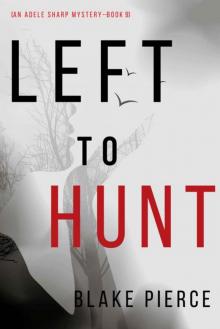 Left to Hunt (An Adele Sharp Mystery—Book Nine)
Left to Hunt (An Adele Sharp Mystery—Book Nine)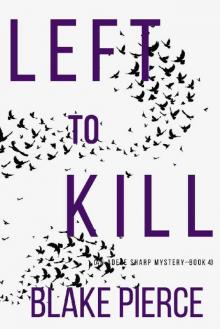 Left to Kill (An Adele Sharp Mystery—Book Four)
Left to Kill (An Adele Sharp Mystery—Book Four)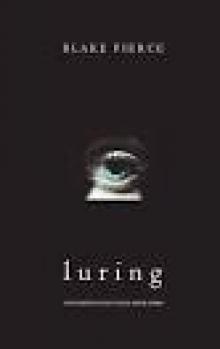 LURING
LURING If She Hid
If She Hid If She Fled
If She Fled Already Gone (A Laura Frost FBI Suspense Thriller—Book 1)
Already Gone (A Laura Frost FBI Suspense Thriller—Book 1) Vengeance in Vienna
Vengeance in Vienna Once Shunned
Once Shunned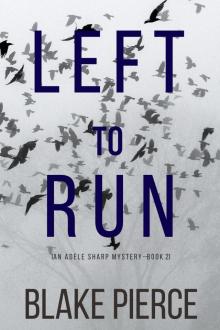 Left To Run
Left To Run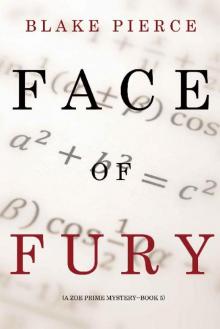 Face of Fury (A Zoe Prime Mystery--Book 5)
Face of Fury (A Zoe Prime Mystery--Book 5) Blake Pierce - Kate Wise - 5 - If She Fled
Blake Pierce - Kate Wise - 5 - If She Fled IF SHE RAN
IF SHE RAN Left to Envy (An Adele Sharp Mystery—Book Six)
Left to Envy (An Adele Sharp Mystery—Book Six) Silent Neighbor
Silent Neighbor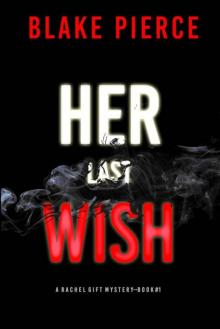 Her Last Wish (A Rachel Gift FBI Suspense Thriller—Book 1)
Her Last Wish (A Rachel Gift FBI Suspense Thriller—Book 1) Almost Lost
Almost Lost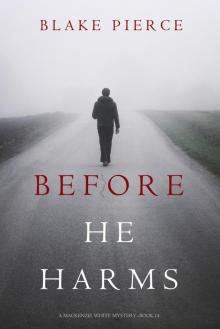 Before He Harms
Before He Harms Murder (and Baklava) (A European Voyage Cozy Mystery—Book 1)
Murder (and Baklava) (A European Voyage Cozy Mystery—Book 1) Left to Vanish (An Adele Sharp Mystery—Book Eight)
Left to Vanish (An Adele Sharp Mystery—Book Eight) THE PERFECT IMAGE
THE PERFECT IMAGE The Perfect Affair (A Jessie Hunt Psychological Suspense Thriller—Book Seven)
The Perfect Affair (A Jessie Hunt Psychological Suspense Thriller—Book Seven)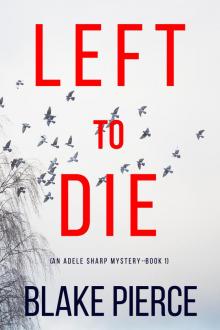 Left To Die
Left To Die BEFORE HE LAPSES
BEFORE HE LAPSES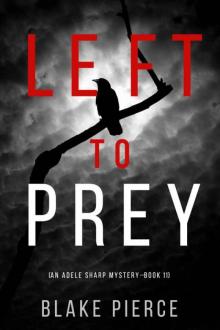 Left to Prey (An Adele Sharp Mystery—Book Eleven)
Left to Prey (An Adele Sharp Mystery—Book Eleven) The Perfect Neighbor (A Jessie Hunt Psychological Suspense Thriller—Book Nine)
The Perfect Neighbor (A Jessie Hunt Psychological Suspense Thriller—Book Nine)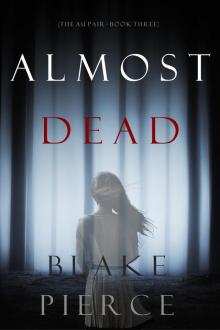 Almost Dead
Almost Dead The Perfect Wife
The Perfect Wife The Perfect Smile
The Perfect Smile If She Saw
If She Saw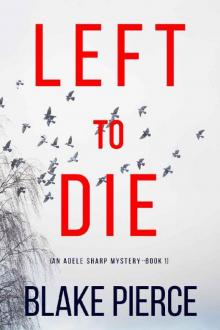 Left To Die (An Adele Sharp Mystery—Book One)
Left To Die (An Adele Sharp Mystery—Book One)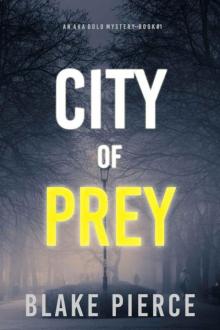 City of Prey: An Ava Gold Mystery (Book 1)
City of Prey: An Ava Gold Mystery (Book 1)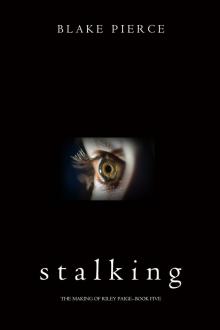 Stalking
Stalking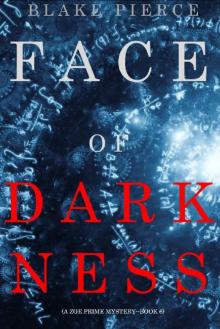 Face of Darkness (A Zoe Prime Mystery—Book 6)
Face of Darkness (A Zoe Prime Mystery—Book 6) The Perfect Mistress (A Jessie Hunt Psychological Suspense Thriller—Book Fifteen)
The Perfect Mistress (A Jessie Hunt Psychological Suspense Thriller—Book Fifteen) Girl, Vanished (An Ella Dark FBI Suspense Thriller—Book 5)
Girl, Vanished (An Ella Dark FBI Suspense Thriller—Book 5) The Perfect Block
The Perfect Block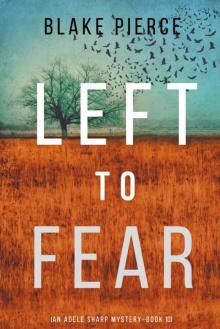 Left to Fear (An Adele Sharp Mystery—Book Ten)
Left to Fear (An Adele Sharp Mystery—Book Ten) Almost Gone (The Au Pair—Book One)
Almost Gone (The Au Pair—Book One) The Perfect Facade (A Jessie Hunt Psychological Suspense Thriller—Book Twelve)
The Perfect Facade (A Jessie Hunt Psychological Suspense Thriller—Book Twelve) The Perfect Affair
The Perfect Affair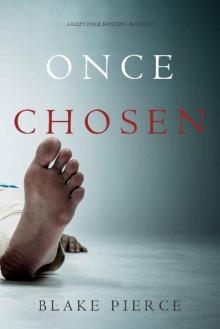 Once Chosen (A Riley Paige Mystery—Book 17)
Once Chosen (A Riley Paige Mystery—Book 17) Girl, Alone (An Ella Dark FBI Suspense Thriller—Book 1)
Girl, Alone (An Ella Dark FBI Suspense Thriller—Book 1)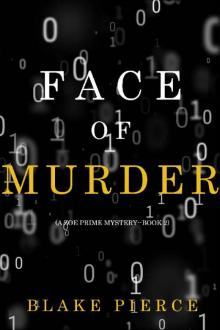 Face of Murder (A Zoe Prime Mystery—Book 2)
Face of Murder (A Zoe Prime Mystery—Book 2) The Perfect Mistress
The Perfect Mistress Crime (and Lager) (A European Voyage Cozy Mystery—Book 3)
Crime (and Lager) (A European Voyage Cozy Mystery—Book 3)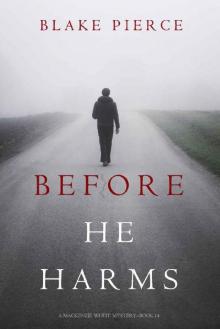 Before He Harms (A Mackenzie White Mystery—Book 14)
Before He Harms (A Mackenzie White Mystery—Book 14)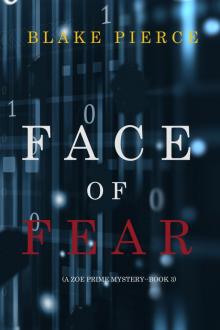 Face of Fear
Face of Fear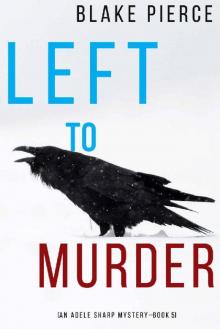 Left to Murder (An Adele Sharp Mystery—Book Five)
Left to Murder (An Adele Sharp Mystery—Book Five) Left to Vanish
Left to Vanish The Perfect Secret (A Jessie Hunt Psychological Suspense Thriller—Book Eleven)
The Perfect Secret (A Jessie Hunt Psychological Suspense Thriller—Book Eleven) The Perfect Deceit (A Jessie Hunt Psychological Suspense Thriller—Book Fourteen)
The Perfect Deceit (A Jessie Hunt Psychological Suspense Thriller—Book Fourteen) Blake Pierce - The Making of Riley Paige - 4 - Taking
Blake Pierce - The Making of Riley Paige - 4 - Taking Death (and Apple Strudel) (A European Voyage Cozy Mystery—Book 2)
Death (and Apple Strudel) (A European Voyage Cozy Mystery—Book 2) THE PERFECT HOUSE
THE PERFECT HOUSE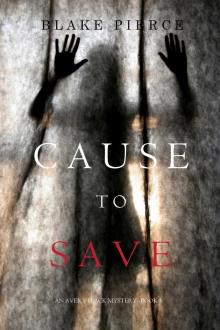 Cause to Save
Cause to Save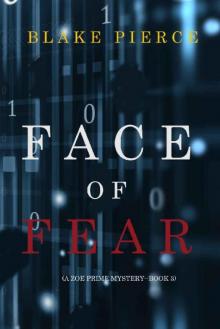 Face of Fear (A Zoe Prime Mystery—Book 3)
Face of Fear (A Zoe Prime Mystery—Book 3)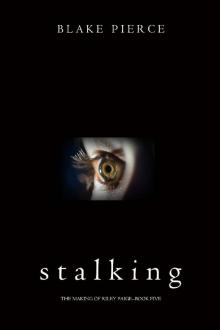 Stalking (The Making of Riley Paige—Book 5)
Stalking (The Making of Riley Paige—Book 5) A Neighbor's Lie
A Neighbor's Lie The Perfect Neighbor
The Perfect Neighbor Once Dormant
Once Dormant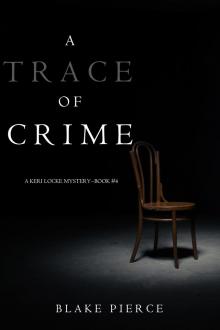 A Trace of Crime
A Trace of Crime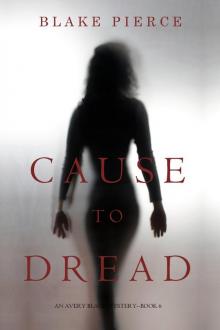 CAUSE TO DREAD
CAUSE TO DREAD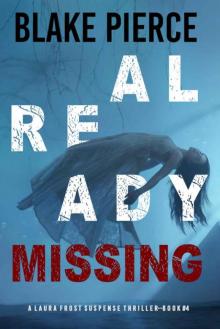 Already Missing (A Laura Frost FBI Suspense Thriller—Book 4)
Already Missing (A Laura Frost FBI Suspense Thriller—Book 4) Waiting
Waiting If She Knew
If She Knew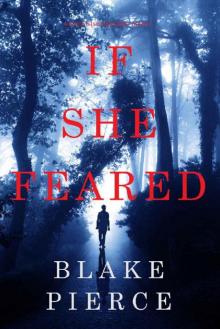 If She Feared (A Kate Wise Mystery—Book 6)
If She Feared (A Kate Wise Mystery—Book 6)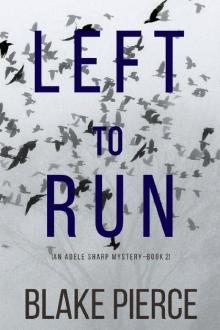 Left To Run (An Adele Sharp Mystery—Book Two)
Left To Run (An Adele Sharp Mystery—Book Two)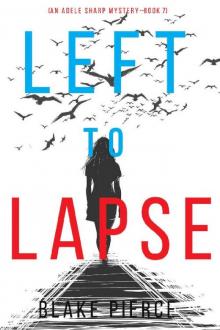 Left to Lapse (An Adele Sharp Mystery—Book Seven)
Left to Lapse (An Adele Sharp Mystery—Book Seven) If She Hid (A Kate Wise Mystery—Book 4)
If She Hid (A Kate Wise Mystery—Book 4) The Perfect Alibi (A Jessie Hunt Psychological Suspense Thriller—Book Eight)
The Perfect Alibi (A Jessie Hunt Psychological Suspense Thriller—Book Eight)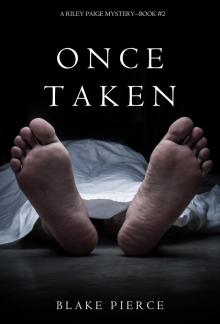 Once Taken
Once Taken Before He Envies
Before He Envies Before He Sins
Before He Sins Mackenzie White 07-Before He Sins
Mackenzie White 07-Before He Sins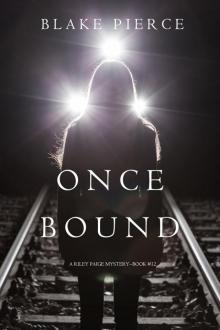 ONCE BOUND
ONCE BOUND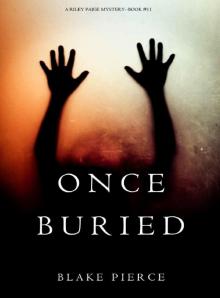 Once Buried
Once Buried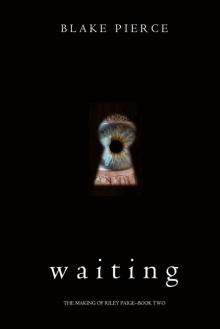 Waiting (The Making of Riley Paige—Book 2)
Waiting (The Making of Riley Paige—Book 2)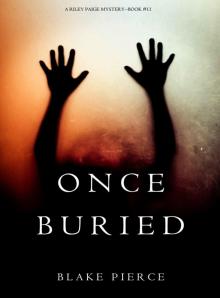 Riley Paige 11-Once Buried
Riley Paige 11-Once Buried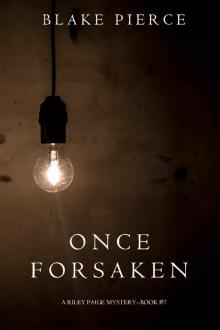 Once Forsaken (A Riley Paige Mystery—Book 7)
Once Forsaken (A Riley Paige Mystery—Book 7) Once Stalked (A Riley Paige Mystery—Book 9)
Once Stalked (A Riley Paige Mystery—Book 9) The Perfect Disguise (A Jessie Hunt Psychological Suspense Thriller—Book Ten)
The Perfect Disguise (A Jessie Hunt Psychological Suspense Thriller—Book Ten)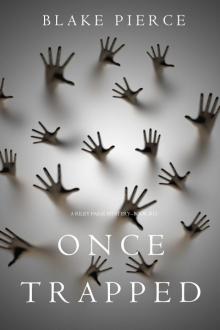 ONCE TRAPPED
ONCE TRAPPED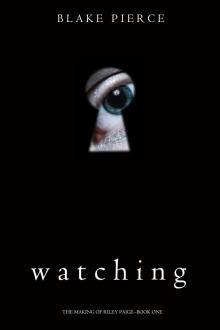 Watching
Watching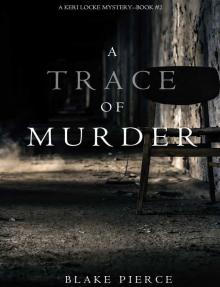 Keri Locke 02-A Trace of Muder
Keri Locke 02-A Trace of Muder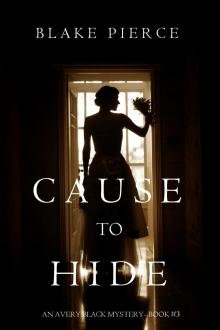 Cause to Hide
Cause to Hide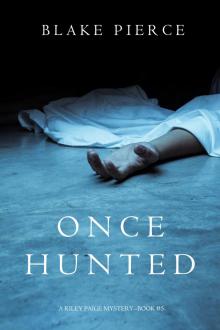 Once Hunted
Once Hunted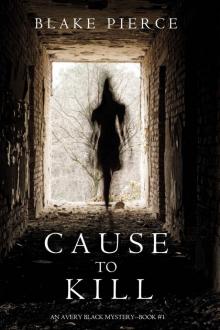 Cause to Kill (An Avery Black Mystery—Book 1)
Cause to Kill (An Avery Black Mystery—Book 1)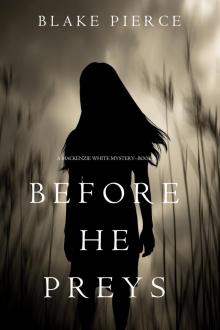 Before He Preys
Before He Preys Once Pined
Once Pined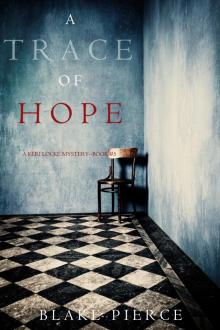 A Trace of Hope
A Trace of Hope Once Craved (a Riley Paige Mystery--Book #3)
Once Craved (a Riley Paige Mystery--Book #3)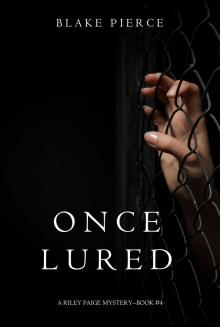 Once Lured
Once Lured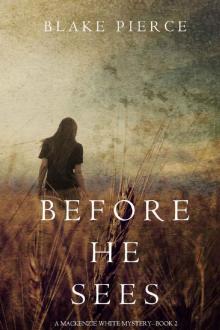 Before He Sees (A Mackenzie White Mystery—Book 2)
Before He Sees (A Mackenzie White Mystery—Book 2) Before he Kills (A Mackenzie White Mystery—Book 1)
Before he Kills (A Mackenzie White Mystery—Book 1)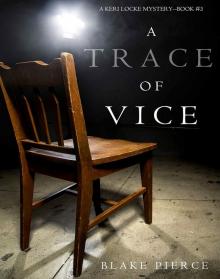 Keri Locke 03-A Trace of Vice
Keri Locke 03-A Trace of Vice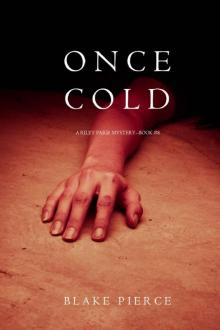 Once Cold
Once Cold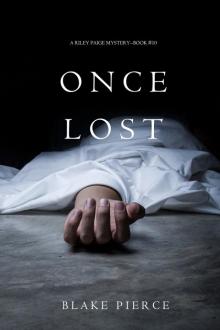 ONCE LOST
ONCE LOST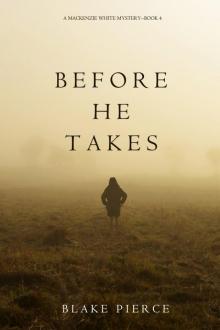 Before He Takes
Before He Takes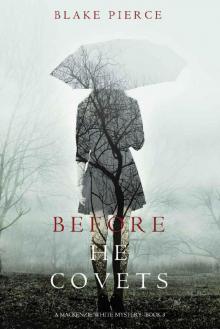 Before He Covets (A Mackenzie White Mystery—Book 3)
Before He Covets (A Mackenzie White Mystery—Book 3) BEFORE HE NEEDS
BEFORE HE NEEDS